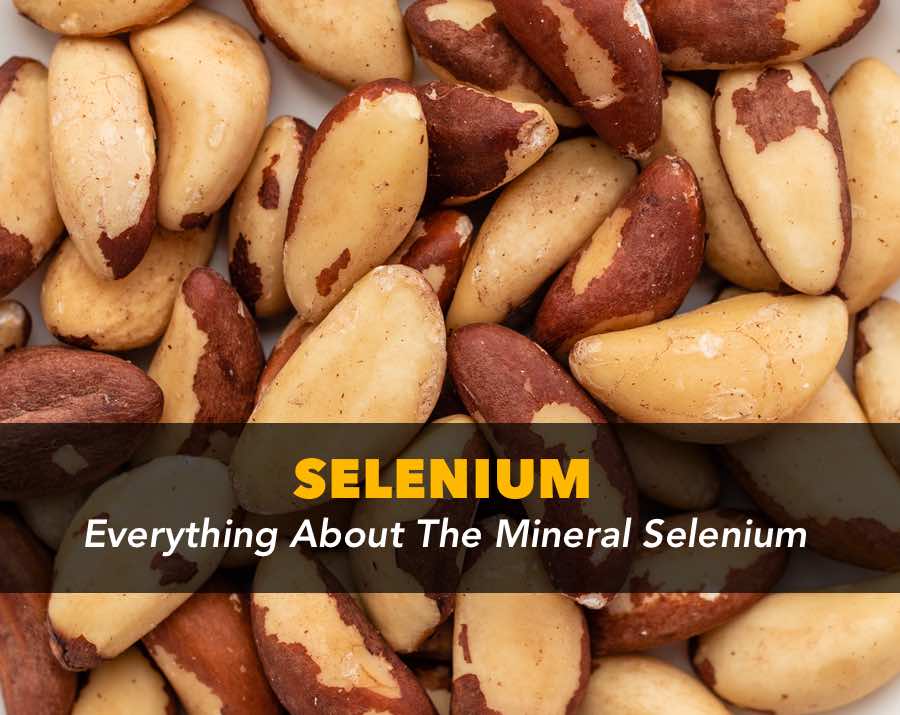Selenium is an essential micro-nutrient for humans. The human body’s content of selenium is about 13–20 milligram. As it is an essential micro-nutrient, humans must consume Selenium either in dietary form or take Selenium Supplement to stay healthy.
Contents
- Physiological Function of Mineral Nutrient Selenium
- Causes of Deficiency of Mineral Nutrient Selenium
- Health concerns due to Selenium deficiency
- Assessment of Selenium Mineral Status
- Selenium Dosages for Supplementation
- Best or most Bio-Available or Active form of Selenium Supplement
- Dietary sources of Selenium
Physiological Function of Mineral Nutrient Selenium
As a trace element Selenium functions as co-factor for reduction of antioxidant enzymes. In a Selenium nutrient deficient state, oxidation of metallothionein may lead to the uncontrolled release of metals, particularly copper and cadmium, thereby contributing to toxicity.
Selenium also plays a role in the functioning of the thyroid gland and in every cell that uses thyroid hormone, by participating as a cofactor for the three of the four known types of thyroid hormone. Selenium may inhibit Hashimoto’s disease (autoimmune disease), in which the body’s own thyroid cells are attacked as alien. With dietary intake of Selenium Supplement following effect may occur:
- Reduction of TPO antibodies
- Reduction in oxidative stress
- Reduction in the effects of mercury & Arsenic toxicity
Causes of Deficiency of Mineral Nutrient Selenium
Dietary availability of Selenium depends on soil as many plants do not Selenium for their survival but the still carry Selenium if it is available in soil. Therefore lack of selenium in the soil may result into decreased intake of Selenium compound. Selenium may not be available in case of Mal-absorption in GI tract due to excess availability of Vitamin C or due to toxicity with Sulfur, Mercury or Arsenic.
Health concerns due to Selenium deficiency
Selenium deficiency affects most physiological systems, including endocrine and reproductive, hepatic, cardiovascular, immunological, gastrointestinal, and musculo-skeletal. Selenium is widely recognized as a key nutrient in cancer prevention and treatment. As selenium intake decreases, there is significant increased risk of colon, prostate, breast, ovary, lung and hematopoetic cancers.
Deficiency of Selenium can result into Compromised:
- Immunity
- Male & female reproductive health
- Cardiovascular health
- Inflammation regulation in asthma
- Thyroid hormone metabolism
Assessment of Selenium Mineral Status
Direct Markets: RBC, Serum, Whole Blood, Hair and Serum Selenium
Functional Biomarkers: Plasma Selenoprotein, Urinary selenosugars
Selenium Dosages for Supplementation
Children 2-12 years: 50 -150 mcg / day (2 brazil nuts per day)
Adult male: 50-200 mcg / day (4 brazil nuts per day)
Adult female: 50-200 mcg / day (4 brazil nuts per day)
Best or most Bio-Available or Active form of Selenium Supplement
Selenium is efficiently absorbed in GI in the form of mixed selenocompounds such as selenocysteine, selenomethionine or Se-methylselenocysteine
Dietary sources of Selenium
- Dietary selenium comes from nuts (Brazil nuts is the richest source),
- Cereals,
- Meat (Kidney),
- Mushrooms,
- Fish (tuna, crab, lobster),
- Eggs,
- Garlic,
- Onions,
- Broccoli and
- Brewer’s yeast.



Hi Anupama
Greatly reseearched articles!
Wanted to check if garlic and onion in cooked form are as good source of selenium.
Indians mostly have garlic and onion everyday in their curries.And still , people like me with hypothyroid are not feeling better 🙂
Also , wanted to check if we need to consult a doc before taking this amount of recommended selenium or it is safe to take on its own .
Also , how long it can be taken without any side effects?